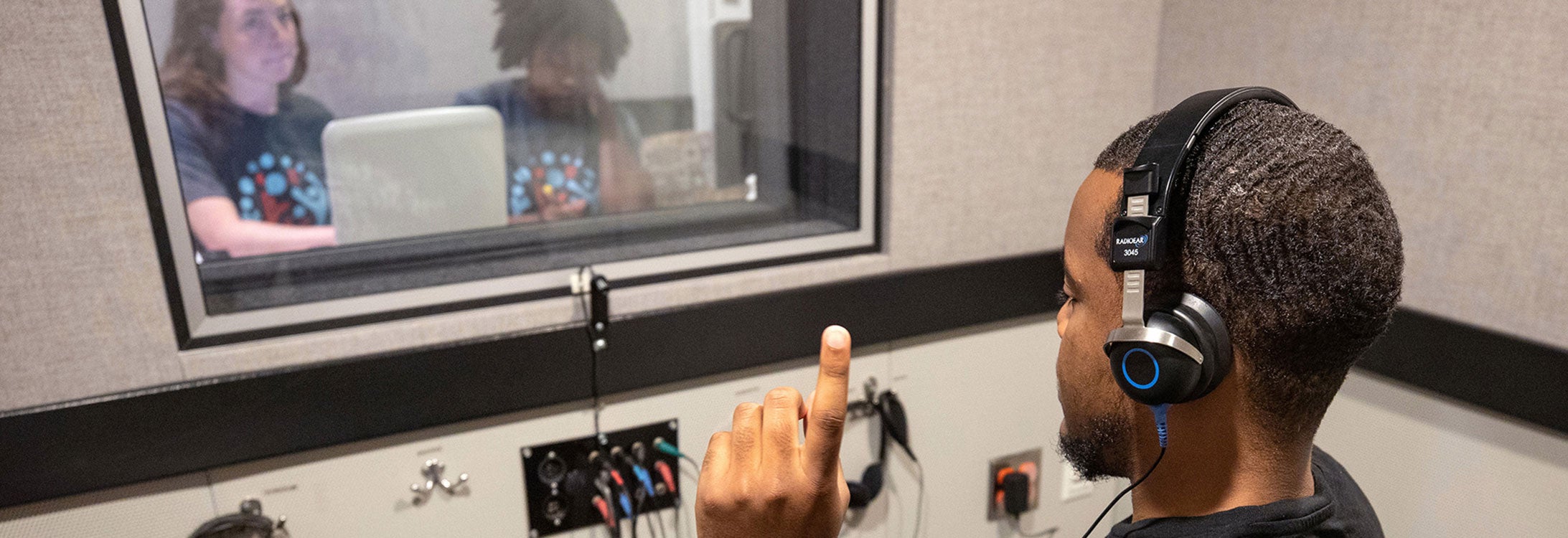Master of Science Admission Information
General Requirements
Candidates for the MS Degree must meet the University Graduate School’s and Department’s Admission standards. General information about the Graduate School can be found at the Graduate School.
Admissions Guide
For information related to admission requirements and how to apply, download CSDI Program Application Booklet (PDF)
Minimum Requirements
- 3.0 overall GPA (undergraduate, post-baccalaureate courses, other MS degrees)
- 3.2 GPA in SLP pre-requisite courses
Prerequisite Courses
The master’s degree program in speech-language pathology or communication sciences requires completed coursework in the following areas at the undergraduate level prior to admission:
Phonetics
Applied phonetics using International Phonetic Alphabet and pertinent modifications. Detailed descriptions of American English speech sounds and transcription of contextual speech representing mainstream and non-mainstream dialects. Transcription abilities developed to assess and treat speech disorders.
Language Development
Normal acquisition and development of language from birth through preschool years, components of language, cognitive and communicative prerequisites, and language learning theories.
Introduction to Audiology
Concepts related to normal hearing, causes and effects of defective hearing, and hearing testing procedures.
Aural Rehabilitation
Habilitation, rehabilitation of the hearing impaired as related to hearing aid use, speech-reading, auditory training, and total communication. Management philosophies related to children and adults.
Development of Articulation & Phonology
Emphasis on birth to five years and critical periods through the early teen years. Content areas include birth cry, babbling, cross linguistic and universal patterns of acquisition, morphophonology, metaphonology, historical and contemporary normative data issues, and interrelation of normal phonological development with other areas of language growth.
Anatomy & Physiology of the Speech & Hearing Mechanism
Basic information, including acoustics, anatomy and physiology of the ear and central auditory nervous system, and psychoacoustics.
Neurology/Neural Processes of Speech/language/swallowing (recommended)
Study of neuroanatomy andneurophysiology including current research of nervous system structures and functions important for speech and language. Critical analyses of current theories of the neurophysiology utilized in speech and language.
Speech Science
Physiology and acoustic correlates of speech production mechanism.
Statistics
What is statistics? As defined by the American Statistical Association (ASA), statistics is “the science of learning from data, and of measuring, controlling, and communicating uncertainty; and it thereby provides the navigation essential for controlling the course of scientific and societal advances.”
A stand-alone course in statistics is required. Courses not accepted:
- any directly related to CSD
- any research methods coursework taught in lieu of, or in the absence of, basic statistics (If statistics and research methods courses were taught in conjunction with each other, you must submit a course description showing a clear delineation between the two in order for them to be accepted.)
(6) Hours of Biological/Physical Science
Biology is the study and characterization of living organisms and the investigation of the science behind living things. Broad areas include: anatomy, biophysics, cell and molecular biology, computational biology, ecology and evolution, environmental biology, forensic biology, genetics, marine biology, microbiology, molecular biosciences, natural science, neurobiology, physiology and zoology.
Physical Science is considered the science that deals with matter, energy, motion, and force. A broad survey of physics principles to enable students to appreciate the role of physics in everyday experiences in today’s society and technology.
*Beginning January 1, 2020, applicants’ coursework in physical science must include content in either physics or chemistry. Please view ASHA specifics related to the requirements.
(6) Hours of Behavior/Social Sciences
These classes are about the systematic analysis and investigation of human and animal behavior through controlled and naturalistic observation and disciplined scientific experimentation. These areas of study attempt to accomplish legitimate,objective conclusions through rigorous formulations and observation.
Possible Content Areas for Social Sciences:
- Anthropology
- Ethnic and Cultural Studies
- Archaeology
- Area Studies
- Economics
- Gender and Sexuality Studies
- Geography Organizational Studies
- Political Science
Possible Content Areas for Behavioral Sciences:
- Psychology
- Psychobiology
- Criminology and Cognitive Science
All pre-requisite course work must be completed with a B or better prior to the first day of enrollment in the master’s degree. Students, who have majored in speech-language pathology (also called Communication Sciences & Disorders, Communicative Disorders, and Speech & Hearing Sciences), etc., will typically have completed the pre-requisites listed above as part of their major. Students who have majored in the speech-language pathology area are given credit for pre-requisites by having the BS/BA in the speech-language pathology area. Note: Students wishing to become licensed in speech-language pathology in North Carolina must have 3 credits of Audiology and 3 credits of Aural Rehabilitation to be licensed; therefore, students are responsible for determining if they are deficient in this area.
Clinical Hours Requirements
The Clinical Hours Requirements pertain to students in the speech-language pathology emphasis; it is not part of the non-clinical communication sciences emphasis.
Each graduate student in the speech-language pathology track of the Master’s degree in Communication Sciences & Disorders is required to accrue clinical clock hours through clinical courses.
Observation Hours (25 clock hour minimum)
All students (campus) are required to submit documentation of at least 25 clock hours observation of SLP or Audiology sessions by July 15th before the Fall semester of enrollment. Students must submit proof of these hours to the Director of Master’s Education for verification and approval. DE, AKDE, AZDE students will be given a deadline after acceptance into the program.
